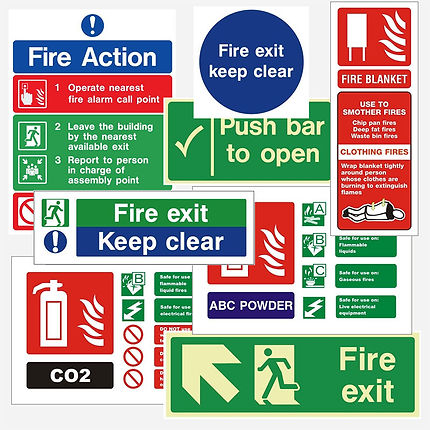
FIRE SAFETY LEGISLATION UK - A GUIDE

Fire Safety Regulations in the UK can sometimes feel confusing and even contradictory. Below we provide a simplified guide to the UK’s current fire safety laws.
Fire safety legislation in England and Wales is gathered under ‘The Regulatory Reform (Fire Safety) Order 2005’, which was designed to simplify the existing legal requirements at the time. All premises used for non-domestic purposes, with a few small exceptions, fall under these regulations. New regulations surrounding new duties for building owners and managers will be coming into effect in 2023, with the introduction of the Fire Safety England Regulations 2022. Additional requirements for domestic premises (particularly multi-occupied residential buildings) is covered across the recently introduced Fire Safety Act 2021.
Every business must have a designated ‘Responsible Person’ whose job it is to makes sure certain duties are carried out, and that action is taken to both prevent fires and prevent injury or death if a fire actually occurs.
As there are nearly twenty thousand commercial fires in the UK each year, these are important duties that should be taken seriously. It is recommended that the ‘Responsible Person’ uses a professional fire safety business to help deliver their business’s requirements.

UK FIRE SAFETY LEGISLATION SIMPLIFIED
01 - Your Fire Risk Assessment
All businesses must have a Fire Risk Assessment. This is the cornerstone of fire protection in your business and, along with your Fire Safety Log Book, is one of the first things that a fire authority inspecting officer will ask to see if they inspect your premises.
Your Fire Risk Assessment doesn’t have to be written down unless you have more than 4 employees, however we would always recommend having it documented for easy reference.
Your Fire Risk Assessment Must:
-
Be reviewed regularly
-
Be documented if there are 5 or more employees in the business, or
-
the premises require a licence, or
-
the fire brigade has issued an alterations notice saying you must do so
-
The fire risk assessment document must record main findings and any action to be taken
You Don’t Have To Use A Professional Fire Risk Assessor If You Choose Not To, But Anyone Who Carries Out A Fire Risk Assessment In Your Business Needs To Be Confident They Can:
-
Correctly identify the potential causes of fire in the business
-
Identify the people at risk
-
Assess the suitability of fire safety measures in place, like fire alarm systems and escape routes
-
Assess the ongoing management of fire safety in the business, such as fire drills and staff training
-
Develop a fire safety action plan if changes are needed
-
Record all the significant findings
-
Implement the action plan if one is needed
-
Keep the fire risk assessment updated on an ongoing basis
Read the government’s guidelines on Fire Risk Assessments >
The penalty for not having an appropriate Fire Risk Assessment and suitable fire safety precautions can be prosecution, with severe fines and, if extreme negligence is proven, prison terms.
02 - Fire Extinguishers
UK fire safety legislation states that you must provide 'appropriate fire-fighting equipment'. This usually means portable fire extinguishers, but some higher-risk businesses may also need hose reels or sprinklers. An example of a higher-risk business would be a restaurant, or one that needs to store chemicals or flammable materials.
Your Fire Extinguishers Must:
-
Be the right type for the business you have and the location they are in
-
Be maintained in good working order
-
Undergo an annual maintenance test
-
Be maintained by a ‘competent’ person
-
They may need to be certified to industry standards

03 - Fire Safety Signs
In our experience, fire safety signs are often overlooked by business owners but in fact all businesses will need at least 2 signs (a Fire Action Notice, and an Extinguisher ID sign) and quite probably more, to be legally compliant.
Here is a summary of the types of fire safety sign and when you will need to use them:
-
Fire Action Notice – explains what to do in case of fire and is mandatory for all premises
-
Fire Extinguisher ID sign – explains and locates each type of extinguisher. Mandatory.
-
Fire exit signs – how to exit in case of fire. Needed for all but the smallest & simplest of properties
-
Fire alarm call point signs – identifies where to activate the fire alarm. Mandatory if you have an alarm.
-
Other fire equipment signs – if you have a hose reel or a dry riser, you must signpost where they are
-
Warning & Prohibition signs – Highlights danger. Needed if there’s extra risk of fire on your premises

Find out more about Fire Safety Sign Legislations >
04 - Fire Alarm Systems
A fire alarm system may not be needed if you are operating your business out of a small premises, such as a shop, where you are able to see a fire developing, and a shout of FIRE would be heard throughout the premises. However some higher-risk businesses, such as restaurants, are recommended to install alarms as an extra safeguard.
Find out more about Fire Alarm Systems >

According to UK fire safety regulations, all other businesses must have an appropriate fire detection system. This means:
-
You will need either a manual or an automatic system
-
You need an automatic system if it’s highly likely that a fire could go undetected or block exit routes
-
Everyone in the building must be able to hear the alarm clearly
-
There must be an alarm call point by every exit on every floor
In addition:
-
Your fire detection system must be maintained in good working order
-
You must test your fire alarm weekly
-
You must have your fire alarm serviced at least every 6 months
-
The person who carries out the testing and maintenance must be competent
-
They may need to be certified and approved to industry standards
Find out more about Fire Alarm Regulations >
05 - Emergency Lighting
UK fire regulations stipulates that emergency lighting is required in buildings for the purpose of providing light if normal lighting fails during a fire.
There are 3 main purposes of emergency lighting:
-
Escape Route lighting: illuminates exit routes & helps occupants find fire fighting equipment in a fire
-
Open Area Lighting: also called ‘Panic Lighting’. Keeps communal areas lit in a fire to reduce panic
-
High Risk Task Area lighting: provides light to shut down potentially dangerous processes in event of fire

You will require emergency lighting if your building doesn’t have enough ‘borrowed’ light to safely exit the premises in the event of a power cut, or in any ‘danger areas’, such as commercial kitchens or plant rooms. Emergency lighting is also recommended in rooms that are larger than 60 square metres.
Your emergency lights should be ‘flick-tested’ monthly (i.e. turned off and on) and undergo a full service once a year.
The latest British Standard recommends that you have a 3 hour emergency lighting test once a year, during which your main light circuit should be switched off and your emergency lights left on for a 3 hour period, to test if any fail to work for the full duration. The 3 hour time window is to allow the fire brigade time to work in the event of a fire once all of the building’s occupants have safely evacuated.
Because it can be highly disruptive to many businesses to have the main light circuit switched off for 3 hours, an alternative way to test is to carry out a 1 hour emergency lighting test twice a year.
06 - Fire Safety Training
Your entire team should know what to do in the event of fire and new employees must be shown what to do when they join your business.
UK fire safety legislation requires the following with regards to fire safety training:
-
Refresher training should be delivered regularly – typically this is annually
-
Fire safety training updates are needed if there are any changes such as building alterations
-
You must carry out regular fire drills
-
You must appoint people, often known as Fire Marshals or Wardens, to do the below in case of alarm:
-
Use fire extinguishers where appropriate
-
Make contact with the emergency services
-
Assist with the evacuation

We recommend that your Fire Marshals are trained by fire safety professionals.
If you would like to read around UK fire legislation in more depth, the government have produced a number of guidance documents to help businesses comply with regulations.
We hope our simplified summary of fire safety legislation and the fire safety order has been easy to understand.
